Smarter Vegetation Intelligence. From Space to Street Trees.
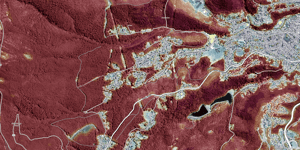
Predictive wildfire mapping for long-term preparedness and planning
What is Geoneon Wildfire?
Geoneon Wildfire provides AI-driven geospatial layers that estimate wildfire severity — how intense a fire would be if it occurred — and building exposure — how much a built asset could be affected if surrounding vegetation burns.
Built for government, insurance, and infrastructure, it supports climate adaptation, planning assessments, and asset prioritisation across large regions.
What Can You Do with Geoneon Wildfire?
Geoneon Wildfire helps you understand where fires are likely to burn most severely — and who or what is most exposed if they do. It goes beyond static hazard maps. Our dynamic, AI-driven model adapts to real-world change, allowing you to detect, measure, and act on evolving wildfire severity and exposure.
Spot treatment areas and monitor regrowth
Identify where prescribed burns or fuel reduction works have occurred, confirm treatment coverage, and measure regrowth over time. Supports evidence-based fire management and planning.
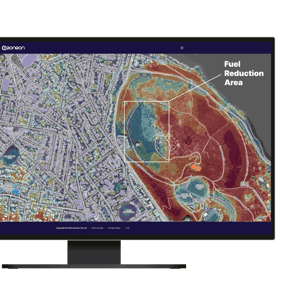
See how exposure shifts as landscapes change
Detect new housing developments, land clearing, or major vegetation changes, and update severity and exposure layers to reflect the new conditions.
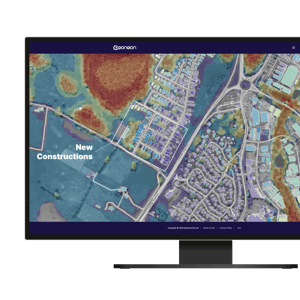
Quantify who and what is most exposed
Aggregate exposure scores for suburbs, LGAs, or other administrative areas to highlight high-vulnerability zones. Ideal for councils, insurers, and emergency managers to prioritise investment and mitigation.
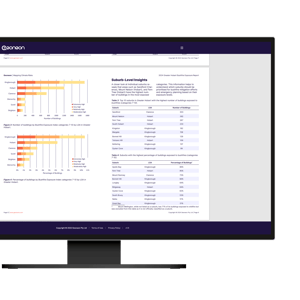
Visualise the Difference
Geoneon Wildfire turns complex data into clear, decision-ready maps. Explore interactive sliders to see how severity and exposure change with the landscape.
Severity Mapping
From vegetation structure, climate data, and topography, the Wildfire Severity Index predicts how intense a fire could burn in any location.


Exposure Mapping
Overlay severity with building footprints to see which assets are most exposed if surrounding vegetation burns.


Change Over Time
Track the impact of prescribed burns, vegetation clearing, or new developments, and instantly see how severity and exposure shift.


How It Works
Geoneon Wildfire combines advanced Earth observation data with AI modelling to deliver accurate, scalable wildfire severity and exposure layers — ready for immediate use in planning, mitigation, and resilience strategies.
Global satellite data
Satellite-derived vegetation, topography, and climate data form the foundation. No LiDAR or costly custom surveys are required, enabling coverage at regional to national scale.
Trained on LiDAR-validated datasets
Our deep learning models are trained on billions of pixels of satellite and LiDAR data, enabling accurate height and cover estimation even where ground truth is limited.
Data in your hands — any way you need it
We deliver outputs in standard geospatial formats, ready to integrate into your workflows: GeoTIFF/ Shapefile, Web services (WMS/WFS), Webmaps.
More Than a Model
Unlike traditional fire spread simulations, Geoneon Wildfire uses a layered predictive approach — the Geoneon Wildfire Data Stack — stacking key spatial predictors to deliver a consistent, scalable view of wildfire severity and exposure anywhere in the world.
Core data layers include:
- Vegetation structure — height, cover, and type from Geoneon Vegetation
- Topography — slope, elevation, and dissection
- Climate context — rainfall, moisture, and projections
- Built environment — building footprints, and proximity to flammable vegetation
- Administrative boundaries & land use — for aggregation and reporting
Proven Accuracy
Designed to reflect real-world fire behaviour, the Geoneon Wildfire model is calibrated and tested against actual fire events. Compared with known fire events to verify predictive patterns and calibrated using event data to fine-tune severity and exposure outputs.
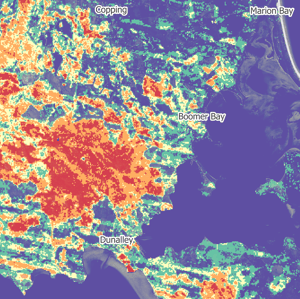
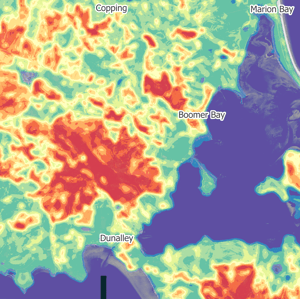
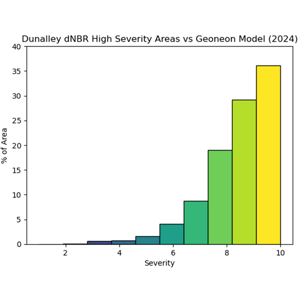
Applications
Bhutan Forest Fire Exposure Index: Enhancing Resilience Through Geospatial Insights
Case Study: Infrastructure Vulnerability to Climatic Disasters in Bhutan
Case Study: Developing an Urban Forest Strategy for the City of Launceston

Ready to Map Wildfire Severity and Exposure?
Whether you need coverage for a single community or an entire region, Geoneon Wildfire delivers actionable severity and exposure insights you can trust.